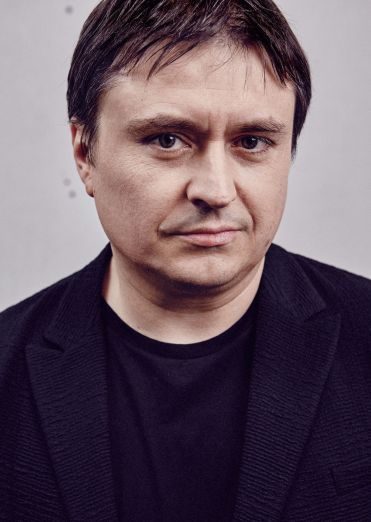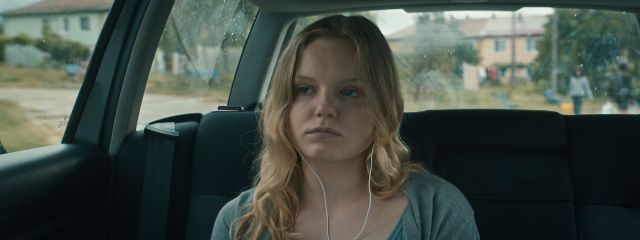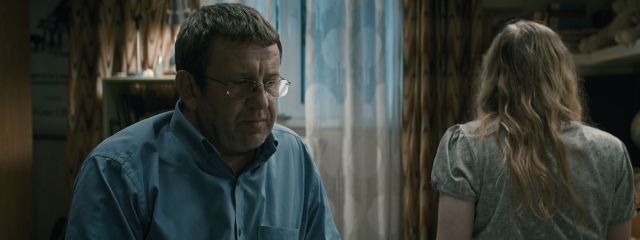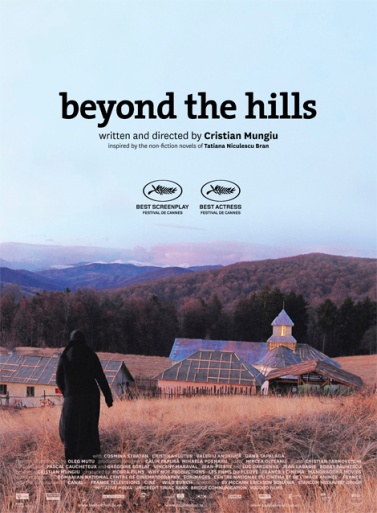By Anita Malhotra
Romanian film director Cristian Mungiu has distinguished himself with a series of award-winning films that explore social issues in Romania in a highly realistic style. The best known of these is the riveting drama 4 Months, 3 Weeks and 2 Days, about a young woman going to great lengths to help a friend obtain an illegal abortion during the late Communist era. It won the Palme d’Or at the Cannes Film Festival in 2007, the first time a Romanian film had won this prize.
He followed it with two more Cannes award-winners: Beyond the Hills (2012), based on a tragic incident that took place in 2005 in a Romanian monastery, and Graduation (2016), about a doctor who uses a corrupt system to ensure his daughter’s academic success.

Poster for Mungiu’s film Bacalaureat (Graduation), which shared Best Director prize at the 2016 Cannes Film Festival
Mungiu, who was a writer before becoming a filmmaker, is also internationally known for the six-part black comedy Tales from the Golden Age (2009), which he wrote and produced.
Anita Malhotra interviewed Mungiu, who was at his office in Bucharest, by telephone on Tuesday, Oct. 4, 2016.
AM: I wanted to start by asking about your latest film, Graduation [Bacalaureat], which won a Best Director Award at Cannes this year and had its Canadian premiere in September at the Toronto International Film Festival. What are the next steps for the film?
CM: The film was bought as a screenplay by many countries and was later sold during the Cannes Film Festival to some other territories. Now I’m in this period when I have to travel and accompany the film because the film starts theatrically in the 40-something countries where it was sold. I started doing this in August in Italy, and I was very happy to see that it was the best-performing art house film in Italy this year.
I will start tomorrow with a small trip accompanying the film to the London Film Festival and New York Film Festival screenings. And by the end of the year it will start theatrically in 15 to 20 countries and I will probably be present at 10 festivals.
AM: How has the number of screenings compared to that of your earlier films?
CM: I think that my last three films were all sold in more than 45 countries, but probably 4 Months performed best because it won the Palme d’Or. At the same time there’s something about this film – it’s somehow more accessible to spectators. It’s either the fact that it’s my third film in a row which got something in Cannes or because it’s not as difficult as 4 Months or Beyond the Hills. The response is really very good. I was very happy to see in Telluride, for example, that they added an extra screening.
AM: You have said that the film grew out of your experience of parenting. What is the connection between your experience of parenting and the subject of the film?
CM: I still live in Romania, so I need to make a decision about my children. I see many parents deciding early on about the education of their children because it’s not the same kind of education if you prepare them to stay and you imagine that they will live here, or if you prepare them to study abroad at the age of 18 and maybe have an international career.
And then there are a lot of small, practical things happening every day which place me in a position to consider what’s best to tell the children. Driving my children to school every day I have to decide if I respect the traffic rules and wait for the red light, and then there are 20 cars getting in front of me, or if I decide to be the first one to cross. Because this is the kind of competition that still exists here because things are not very well settled.
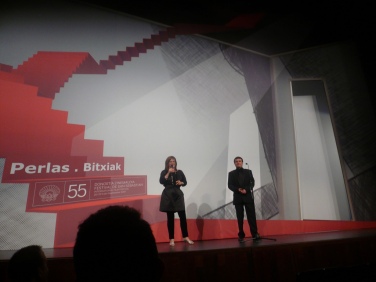
Mungiu on Sept. 20, 2007 at the San Sebastian Film Festival in Spain (photo by birasuegi, Flickr Creative Commons)
AM: How many children do you have?
CM: I have a couple of boys.
AM: And how old are they?
CM: 11 and 6.
AM: Going back to the beginning of your career, why did you decide to become a filmmaker rather than a different kind of artist like a novelist or playwright?
CM: I don’t know – this is hard to say. I was attracted to film, but to be honest I first thought I was going to become a novelist, so I started expressing myself in writing. I was writing short stories and stuff like that.

Still from Tales from the Golden Age (2009), written and co-produced by Mungiu (photo courtesy of Mobra Films)
And then I worked for a few years as a kind of journalist for a magazine where I was writing things which were quite close to fiction rather than reportage. Then I studied literature before deciding that it was time for me to go and study film. But I’ve always kept this idea that someday I will get to do what I really feel I know best, which is writing.
AM: How did you learn the craft of filmmaking?
CM: I went to film school, and because I was a bit older and had to pay for my studies because I had studied something before, they allowed me to work during my studies. So at the same time as film school I was working as an assistant director for foreign films being shot in Romania – American and French films. And that was like a second school which placed me in contact with the real world of filmmaking.
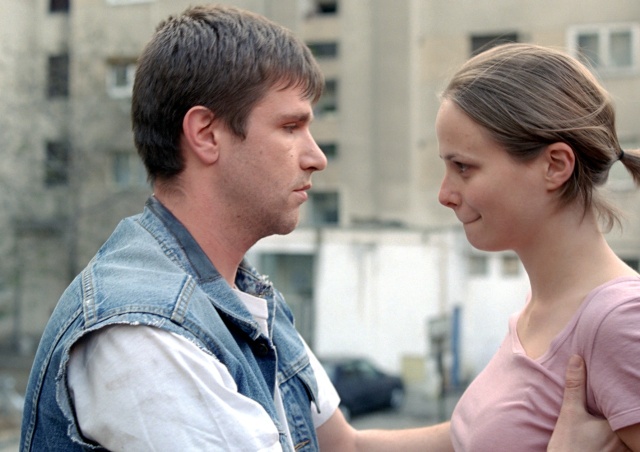
Diana Cavallioti and Radu Iacoban in “The Legend of the Air Sellers” from Tales from the Golden Age (2009), a dark comedy featuring urban legends from Romania’s late Communist era (photo courtesy of Mobra Films)
I was very fortunate that there was a new cinema law created right after I graduated, so I applied to this screenplay competition, and I won three competitions in a row. So for the first two or three years after film school I was practicing doing short films. I also practiced during my first film – a very complicated and intricate kind of structure.
AM: Was it hard to raise money for your first feature film, Occident?
CM: Yes. My first feature film was very complicated because there were no other resources in Romania except this pay fund. We got this fund, but it was too little to produce the film. By the end of the shooting we ran out of money, so I had to bring everything I had back home to finish the shooting.
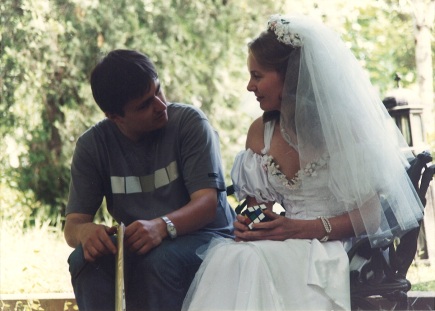
Cristian Mungiu with actress Tania Popa on the set of his first feature, Occident (2002) (photo courtesy of Mobra Films)
And then there was a very long process of trying to finance post-production, until the film was about to be screened in the Rotterdam film festival and was included in the catalogue. We couldn’t finish the film on time – we didn’t have the money. And we were lucky again. The lady selecting films for Quinzaine des réalisateurs saw the film in the catalogue. She called me, and with this promise of being in the Quinzaine, I got some money from our film fund and managed to finish the film. So it was a kind of a long and adventurous process, but also a very good experience.

Alexandru Papadopol and Anca-Ioana Androne in Cristian Mungiu’s 2002 film Occident (photo courtesy of Mobra Films)
AM: Tell me about the founding of your production company, Mobra Films.
CM: I did this with a couple of friends – my cinematographer that I was working with and another friend, a director from the film school who was working with the same cinematographer. I had already done all these shorts and my first feature for different film companies. So it just made sense, since I was pretty much financing my films myself, to start this company.

Still from Offset (2006), directed by Didi Danquart, which was associate-produced by Mobra Films (photo courtesy of Mobra films)
We started by making a small film, which was screened in the Berlinale. And we managed to finance 4 Months with a very little budget, but to finance it entirely in Romania, and to be present in Cannes and to get the Palme d’Or without any kind of financial support from a producer. And of course, after that, things were easier.
And the company grew and now we are producing some other people as well. We developed a distribution company and other smaller companies that we use to organize a festival in Bucharest. It’s a very small industry here in Romania, so we are involved in everything. I release my own films, I release foreign titles, we organize this festival. I’m involved in education because the audience for this kind of filmmaking is really shrinking, so you have to invest in education a lot.
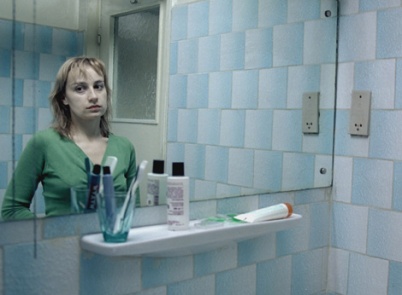
Anamaria Marinca in 4 Months, 3 Weeks and 2 Days, which won a Palme d’Or at the 2007 Cannes Film Festival (photo courtesy of Mobra Films)
AM: For 4 Months, why did you choose this particular subject out of so many stories that you could have told?
CM: I knew that I wanted to make a very dramatic story happening in a very short time, like a couple of hours or days, and to speak about something that’s important for me. I had known about this story for a long time, and then I talked again to this girl, who was the protagonist of this story originally, and I had the revelation that that story matched the profile for the film I wanted to shoot. It was a difficult story for everybody to handle, but I thought it’s kind of therapeutic that we speak about it.
I think that all my films are connected somehow with the age that I was when I made them and with the things that were happening to me. I was becoming a father and I was considering some things differently from 15 years before.

Tania Popa, Anamaria Marinca and Vlad Ivanov in 4 Months, 3 Weeks and 2 Days (photo courtesy of Mobra Films)
AM: Watching the film, I felt that I was inside the film with the characters – it felt so real. How did you achieve that feeling of reality?
CM: I don’t know. I think the best thing about the film is that for two hours you feel, rather than understand conceptually, how it is to live in this kind of oppressed society when people felt that they were followed and observed all the time.
I was trying first of all to find the right situations that would help me to position the viewer in that situation, and then I was trying to cut all the regular crap that you use when you make mainstream cinema – to have it very simple, very plain, just one shot per scene, close to the characters, follow them with the camera. If the characters are still, we are still; if they move, we move. Never do anything that would signal that there’s a filmmaker behind the camera. There is no music added. So it’s kind of simple and humble.
And then the story was very strong and there’s something good about the atmosphere. But to be honest, sometimes in filmmaking – on top of everything that you do – there’s something which just happens, which just makes the difference between a great film and a good film.

Mungiu on Sept. 20, 2007 at the San Sebastian Film Festival (photo by birasuegi, Flickr Creative Commons)
AM: Were people in your country shocked by the subject matter?
CM: Not as much as I hoped. The public success of the film pretty much killed the polemic aspect in the sense that everybody was so happy that we got the Palme d’Or. People felt as if Romania got the gold medal in skating or whatever. I got the key to my home town and a medal from the president – these kinds of honors – but I really wish that people would consider more what the film has to say.
Still, it was watched by many people. It had a very good result in Romania and eventually managed to stir some memories. I had a lot of Q & As for that film, and people of my generation, especially women who had to undergo such very painful interruptions of pregnancy, experienced the film in a very personal way.
AM: The films of yours that I have seen portray a very bleak view of Romania, where characters are trapped in situations out of their control. Can you talk a bit about that?

Still from Tales from the Golden Age (2009), written and co-produced by Cristian Mungiu (photo courtesy of Mobra Films)
CM: I think that films are just films and we shouldn’t consider that the whole society is represented in somebody’s films. There’s a lot of bleakness, and when you watch Graduation you’ll see that. There’s a lot of corruption as well, but at the same time I never claimed that these stories, which are meant to heal the society, are fully representative of what happens in a country.
Of course there’s been a lot of progress in Romania, historically speaking, since the fall of Communism, but it’s just that people don’t live on a historical scale – they live on a human scale. So from a human perspective you tend to focus more on things which are not yet solved, and wished they would be solved 25 years after the fall of Communism.
And, this is what you sometimes expect to do with art – to speak about aspects of society which are not really functional because you hope that maybe this might change something. But of course there are funny little Friday evening comedies opening up here. I am not sure they are representative also.

Cosmina Stratan and Cristian Mungiu on the set of Mungiu’s 2012 film Beyond the Hills (photo by Sebastian Enache)
AM: Who are your major cinematic influences?
CM: I was always trying to get inspiration from life and to understand if there’s any kind of narration in life, what would be the rules of that narration. This is why I’m shooting like this – with just one shot per take. There are single, individual moments when we try to preserve the truth of what happens, and therefore it’s not that I’m influenced by a very unique, single, precise filmmaker or current or period.
Films are already an interpretation of life, so I’m watching films and of course I feel close to Italian Neorealism and the films which got back to realism from time to time in the history of cinema, but I tried to never have a very precise strong filmmaker influence in me.
AM: You do a number of things – scriptwriting, directing and promoting your films. How do you juggle all these things, and are you doing other work as well?
CM: I spend most of my time with my children. That’s my life actually and I have this company, so it’s quite enough to make your own films and to write your own films and release your own films, to handle your children and to take the time to be with them every day and to handle your company. But I do make commercials from time to time. I do some teaching from time to time.
And on top of this, we invest a lot of time in organizing film screenings in Romania, because we lost most of the cinemas that we had in this country 25 years ago. So it’s a very complicated process of organizing screenings and festivals and bringing the audience back to watching films in theatres. People got into the habit of watching everything on the computer and mobile by downloading films illegally from the Internet. And I’m very much involved in restructuring the legal system in which cinema works in Romania – in rewriting cinema law. Somebody needs to do this and I’m involved in this.
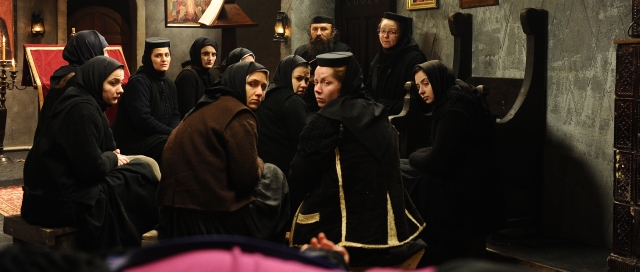
Still from Mungiu’s Beyond the Hills, which won two acting awards at the 2012 Cannes Film Festival (photo by courtesy of Mobra Films)
AM: Do you have any idea what your next project will be?
CM: I’m always asking myself if I’m capable of making one more good film. I don’t plan this as a career. I don’t see further than my next film. I travel about six months after each film, so I will start thinking about my next project sometime in February next year. I wrote a screenplay before this one, but I’m not sure I’m going to make that one.
I have a lot of questions about making something in English, but I still live in Romania so it’s not clear to me if I can write something or not that would happen naturally in English. But I will think about this and I will think about what’s personal and important for me now and see what comes out of it.
For more information about Cristian Mungiu and his films, please visit Mobra Films.

